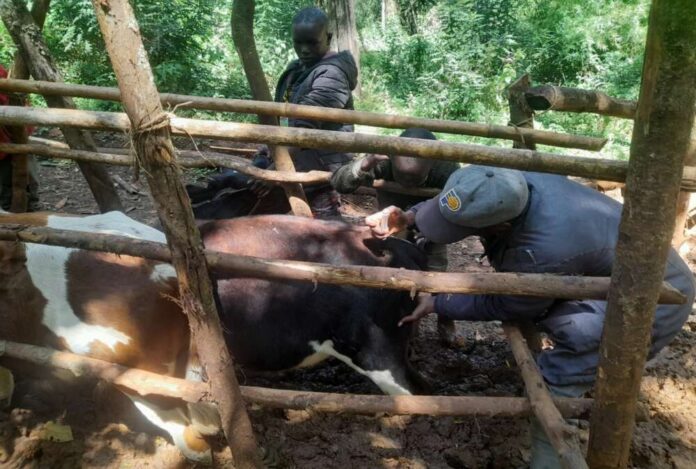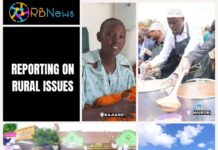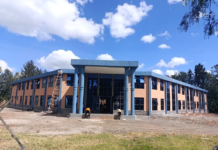
By Emanuel Kipkorir Tarus, DevReporter, Trans Nzoia County

Key highlights
- Government targets 22 million cattle, 50 million goats and sheep for vaccination
- Vaccination meant to control transboundary animal diseases, enhance animal productivity
- Kenya Veterinary Vaccines Production Institute (KEVEVAPI) manufactures vaccines to be used
- Farmers, Kenya Veterinary Association oppose mass vaccination
- President William Ruto insists the exercise will go on despite opposition
Beginning January 2025, the government of Kenya through the ministry of Agriculture and Livestock Development started the process of vaccinating 22 million cattle and 50 million sheep and goats in a nationwide mass vaccination.
The Ministry of Agriculture and Livestock development is conducting this ambitious programme. The vaccination is meant to control transboundary animal diseases such as Foot and Mouth Disease (FMD), Peste des Petits Ruminants (PPR) among others, thus enhancing animal health and productivity.
Despite government’s assurance that vaccines manufactured by the Kenya Veterinary Vaccines Production Institute (KEVEVAPI) are safe, this programme is becoming unpopular with time.
Radio Baraza sought to find out why farmers are opposed to the programme that will cost the taxpayer unknown amount of money.
Livestock farmers express their concerns
In Chepchoina area of Endebess Constituency in Trans Nzoia County, Silas Wafula, a dairy farmer said that he was not ready to vaccinate his livestock because they have not been sufficiently sensitised.
“the President gave out his opinion and advice about this vaccination but we are not fully convinced because we don’t know what informed the decision to mass vaccinate our animals,” Said Wafula.
Wafula’s biggest worry is that like many other farmers in rural areas, he does not have confidence in the vaccines.
“First of all, we really want know if the vaccines are preventive or curative. We would also like to know the exact reason why this is done. Suppose we vaccinate our animals and they later die, who will be liable?” Wafula asked.
North Rift farmers oppose mass vaccination
Still in Trans Nzoia, Michael Seroney, a large-scale dairy farmer argues that mass vaccination is a threat to many livelihoods.
“Our cows, goats and sheep will die. Where will we get money to take our children to school, feed them and pay other bills? President Ruto please, stop this thing immediately because everybody is bitter about it,” Seroney urged.
In Kesses Constituency, Uasin Gishu County, Grace Mwangi questioned the objective of the programme that has received huge opposition.
“They have told us that it is voluntary but again, they are saying that those who will not vaccinate their animals will not be allowed to sell products from their animals either nationally or internationally. Is that not forcing us to vaccinate?” Mwangi asked.
Farmers are afraid that their animals will die if vaccinated due to deeply rooted mistrust of the government and leaders. This can be addressed by carrying out nationwide sensitisation on the importance of vaccination.
Kenya Veterinary Association calls for postponement
Following widespread condemnation of the programme, the Kenya Veterinary Association (KVA) asked the government to postpone it due to lack of public trust, inadequate public awareness, politicisation and veterinary challenges in County governments.
Components of the vaccines
The vaccines contain inactivated virus strains to stimulate immunity without causing disease. They may also include stabilizers, preservatives and adjuvants.
Despite these, President William Ruto and his administration maintains that the exercise will continue to improve livestock productivity and control diseases.
President Ruto insists that vaccination exercise will be done despite opposition
Speaking on 17 December 2024 during the annual Kimalel Goat Auction in Baringo County, Ruto urged Kenyans to disregard what he termed as propaganda and fake news.
“Leaders who have no understanding of livestock sector should not use fake news and propaganda to mislead farmers not to vaccinate their animals,” President Ruto stated.
Controlling transboundary animal diseases supports the economic pillar of the Kenya Vision 2030 by improving animal productivity, reducing losses and boosting Kenya’s agricultural exports.
Part 1 of the Fourth Schedule of Constitution of Kenya mandates the National Government to develop policies and guidelines for nationwide vaccination and transboundary disease control. Veterinary services including disease control and vaccination, is a devolved function. Further, KEVEVAPI ensures that all the vaccines meet quality and safety standards.
The government erred because it by-passed some of the processes like disease surveillance and risk assessment, public participation and legislative compliance before rolling out such a massive campaign.
Related Stories
https://www.voanews.com/a/kenyan-president-strongly-defends-animal-vaccination-program/7905837.html
https://www.kenyanews.go.ke/kenya-to-use-local-vaccines-for-livestock-vaccination/
https://www.youtube.com/watch?v=f_6p0QmYh_U
https://www.president.go.ke/livestock-vaccination-programme-will-continue-as-planned-president-ruto/





